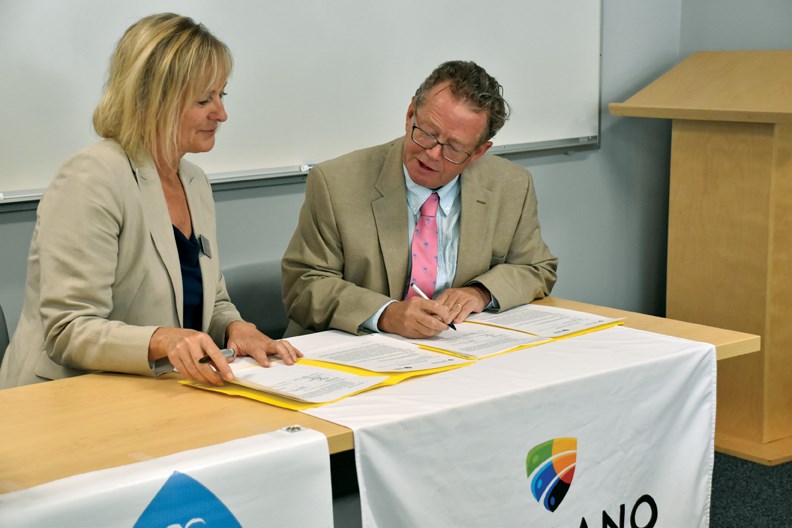A memorandum of understanding (MOU) signed by Capilano University and the Ruby Lake Lagoon Society could pave the way for academic, fundraising and community collaboration between the university, the society and its $27-million project, the Pender Harbour Ocean Discovery Station (PODS).
“We always anticipated Cap U would be a very closely aligned partner. The more we spoke together, the more closely aligned we were,” said Michael Jackson, executive director of PODS.
He called the agreement, which was signed at Capilano University’s kálax-ay Sunshine Coast Campus in Sechelt on Wednesday, a “huge partnership.”
Paul Dangerfield, president of Capilano University, said in a release, “We are truly excited about the hands-on learning experiences PODS could deliver for our students.”
While programming has not been formalized, the MOU is designed to facilitate project collaboration and to create opportunities for students from the teaching-focused university’s North Shore and Sunshine Coast campuses.
That could take the form of student participation in the PODS Coastal Waters Monitoring Program and other research projects, but is expected to extend to non-scientific areas such as film studies, business and professional studies and environmental education, according to the release.
“We had to get the MOU sorted out and signed before we could roll our sleeves up,” said Jackson, adding that a brainstorming event is planned at the North Shore campus to introduce the PODS project to students and departments.
After the signing, the university’s vice president academic and provost Laureen Styles told Coast Reporter the institution wants to expand its course offerings on the Sunshine Coast and sees the MOU as informing that process. She also said courses, on the North Shore primarily, could start including society projects as early as January. “Now with a signed MOU we have a direct path into Ruby Lake and current activities they’re already doing,” she said.
While the MOU promises more funding and academic opportunities for the nascent marine science facility and tourism and culture centre, this isn’t the first MOU between PODS and a university. In 2017, the Lagoon Society entered into an agreement with the Pacific Water Research Centre at Simon Fraser University. Other institutions, including some in the U.S., are also interested, said Jackson.
The MOU will last five years but Jackson said he hopes to see that timeline extended to 20 years. “There needs to be stability in the long term.” That sentiment was repeated at the signing with Styles stating the university is viewing the collaboration through a “long-term lens.”
“I have a lot of confidence in our relationship,” said Styles, “We will see a future where we have a wonderful science education centre where Capilano is a key partner in that.”
The MOU is also expected to open up fundraising opportunities, since it could make it easier to access federal and provincial grants, something the society is actively pursuing now that it has received approval from the Sunshine Coast Regional District (SCRD) to begin construction, which is expected to start as early as May 2020. The facility is projected to be up and running by 2022.
In the meantime, the society is working to raise at least $10 million, which will make it more attractive for certain federal grants that can provide matching funds to cover up to three-quarters of the projected $27-million cost.
And the project isn’t just on the university circuit’s radar.
Jackson also told the audience at the signing he was recently invited to meet with Prime Minister Justin Trudeau in Horseshoe Bay to discuss PODS. The meeting lasted about 15 minutes and Trudeau was “very well briefed,” said Jackson. The society is non-partisan and the visit took place about 10 days ago, before the official launch of the federal campaign.
Jackson dedicated the day to Jim Rossi, former chair of the Lagoon Society, marine biologist and diving instructor at Capilano University, who died three years ago. “He changed so many children’s lives,” said Jackson of Rossi’s work to educate youth about the marine environment. “PODS grew from that idea.”



